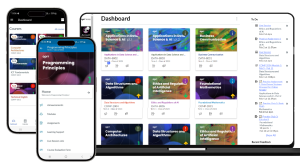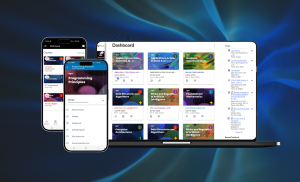Search inside The Magazine

Source:
Pubished on June 27th, 2024.
Open Institute of Technology holds talks with Malta education authorities, on potential research collaboration
June 27th, 2024
2 min reading
Officials from an online Higher Education Institute based in Malta met with education authorities last week to discuss opportunities for collaboration on innovative fields of research.
The Malta-based Open Institute of Technology (OPIT) held talks with Education Minister Clifton Grima, among others, discussing increased appetite for innovative courses from Maltese students, as well as the potential of research collaboration with local entities.
OPIT is an EU-accredited Higher Education Institution, specialised in offering online degrees in Technology.
OPIT programmes and degrees are fully accredited by the Malta Further and Higher Education Authority (MFHEA) and include innovative courses on game development, cyber security, and development.
The institute was represented during the talks by its rector, a former Minister of Education of Italy, Prof. Francesco Profumo, as well as Riccardo Ocleppo, OPIT’s founder.
Aside from Minister Grima, the two also met with the CEO of MFHEA Rose Anne Cuschieri, and University of Malta Pro-Rector Prof. Frank Bezzina.
Ocleppo provided comprehensive feedback, including quantitative data from OPIT surveys, and qualitative feedback from students and companies, and identified areas for improvement.
Notably, there was significant interest from Maltese students regarding enrollment in 2024.
OPIT currently offers a range of accredited degrees, and plans for future program expansions were also discussed.
Following his attendance at OPIT’s inaugural academic year opening in September, Mr. Ocleppo met with Minister Grima to provide a personal update.
Together with Professor Profumo, they discussed OPIT’s milestone of enrolling over 100 students from 38 countries.
The discussion also touched upon the benefits to Malta from hosting institutions such as OPIT, including collaboration between online and physical institutions.
Additionally, Ocleppo proposed hosting next year’s graduation ceremony in Malta for the first graduates of its Master of Science Program in Data Science and Artificial Intelligence.
The meeting with Pro-Rector Bezzina meanwhile, focused on potential collaboration between OPIT and the University of Malta.
Discussions included opportunities for joint research projects, student exchange programs, and other collaborative initiatives that would benefit both institutions and enhance the educational landscape in Malta.
Read the full article here:

Sources:
- Il Sole 24 Ore
- La Stampa, also in physical edition from June 14th, 2024, page 49.
Pubished on June 13th, 2024 by Teleborsa.
Italian university students are focusing on STEM degrees and online education for greater job opportunities
June 13th, 2024
5 min reading
63% of Italian university students believe that a degree in technical, digital or IT disciplines offers greater job opportunities than all others, demonstrating the importance of STEM skills in obtaining more employment opportunities at the end of the university cycle. This is a preference that is expressed not only by those who attend degree courses in this field, but also by students of humanities universities.
Furthermore, undergraduates also have clear ideas about the different ways to attend courses: 57% prefer a hybrid model of university education, with a balanced combination of in-person and live streaming lessons, as well as asynchronous digital content that can be accessed at any time. However, since this polarization between in-person universities or online universities still exists in Italy (11 online universities in the country), 73% of university students declare that they would be willing to attend exclusively online university courses if they were of recognized quality; ideally, if they were able to make the choice of taking a degree path again, 44% of students would no longer orient themselves towards a physical university but towards an online one, as long as it is a quality one.
The data emerge from a survey by OPIT – Open Institute of Technology, an academic institution accredited at European level, that carried out a sample of 1500 high school and university students belonging to the Docsity community, a platform for sharing documents and content of student interest, with more than 15 million members.
The research was presented during the event “University education in the era of Artificial Intelligence” (L’istruzione universitaria nell’era dell’Intelligenza Artificiale) which took place in Turin at Spazio35 at the Intesa Sanpaolo skyscraper. Moderated by the journalist Enrico Pagliarini, the discussions included Professor Francesco Profumo, Rector of OPIT (Open Institute of Technology) and former Minister of Education; Elena Bonfiglioli, Global Business Leader of Microsoft; Germano Buttazzo, senior manager for the Academic sector of LinkedIn; Alessandro Risaro, founder of DataPizza; and Riccardo Ocleppo, founder of OPIT and Docsity.
Read the full article (in Italian) here:

Source: La Repubblica, also in physical edition from June 17th, 2024, page 1.
Written on June 17th, 2024 by Marta Borghese.
The former minister is the rector of the online university founded by Ocleppo from Turin: “Today we should go back to school more often”
By Marta Borghese, June 17th, 2024 at 02:00
2 min reading
“Educational models are the products of the industrial revolutions in which they were developed”. In the ongoing revolution, where humans are interacting with machines capable of learning, “the speed of change and the uncertainty of the future require us to think of much more flexible models than in the past”.
Francesco Profumo, former Minister of Education with the Monti Government and now member of the European Innovation Council of the European Commission, speaks as rector of OPIT, Open Institute of Technology, the university founded by Riccardo Ocleppo from Turin and dedicated to Computer Science. A reality conceived in Turin – “a place of thought”, comments Profumo – but based in Malta and with a global spirit, which in the first year of its launch attracted 100 students from 40 countries.
Full article (in Italian) here: La Repubblica

At OPIT – Open Institute of Technology, we understand that academic success requires more than just textbooks and lectures. That’s why we offer a comprehensive learning support system designed to empower students at every stage of their educational journey.
Your Success is Our Priority
Our robust learning platform, Canvas LMS, is your one-stop for everything academic. It provides seamless access to course materials, including asynchronous video lectures you can revisit at your convenience, engaging and interactive live sessions, and practice quizzes and assignments to solidify your understanding.
A Network of Support at Your Fingertips
But the resources don’t stop there. OPIT fosters a collaborative learning environment through discussion forums where students, tutors, and professors can exchange ideas and solve doubts. Our highly qualified tutors, possessing a minimum of an MSc degree, are available around the clock to address any course-related queries, both theoretical and practical. Additionally, a dedicated Class Coordinator assists with administrative concerns, ensuring a smooth learning experience.
Track Your Progress, Achieve Your Goals
Canvas LMS also empowers you to stay on top of your academic progress. View your monthly calendar to stay ahead of deadlines, access your grades to gauge your performance, and utilize this information to set realistic goals for upcoming graded sssessments. With all the tools readily available, you can plan effectively and approach your studies with confidence.
Experience the OPIT Difference
To get a glimpse into the daily routine of an OPIT student and discover how our learning support system simplifies your academic journey, click on the link below and watch the full video: “A Day in the Life of an OPIT Student.” See for yourself how OPIT empowers you to excel in your studies and achieve your academic aspirations.
Click Here: A Day in the Life of an OPIT Student

Source: La Stampa, also in physical edition from June 09th 2024, page 24.
Francesco Profumo: “The ministry only supervises individual acts. Autonomy is not in question”
The former president of Compagnia and Acri: “The system of institutions has antibodies. For appointments, the triad mechanism doesn’t work, a simple indication is better”
By Claudia Luise, June 9th, 2024 at 12:17
4 min reading
“Foundations have the antibodies to overcome complicated moments”. Francesco Profumo, former President of the Compagnia di San Paolo and former President of Acri (l’Associazione di Fondazioni e di Casse di Risparmio italiane) answers the phone while he is at the airport, engaged in his double life as a trainer with the academic institution OPIT (of which he is rector) and an innovator with Isybank, the online bank of Intesa Sanpaolo (of which he is President).
What is your opinion on the Crt Foundation affair?
“I don’t want to go into the Crt issue, because I don’t know the details and it’s not my responsibility, but I can report my personal experience, as a former president of the foundation. In recent months, the Compagnia di San Paolo has undertaken the process of revising its statute and renewing its governance, everything went smoothly and within the expected time frame. I believe that the Society’s statute is a good statute and that it can also be a model for other foundations. As preliminaries to the revision of the statute, which is approximately 10 years old, the new post-pandemic national and European context, the hybrid territorial foundation model and the new operating methods tested in the last 8 years, during my presidency, were posed. The designating bodies have a very important role, because they designate the Councilors of the new governance, with the skills necessary to make the foundation work well collegially. The designations are “dry”, one for each position to be renewed. The Steering Committee constitutes a collegial evaluation of the CV of each designee and votes on their appointment. The Directors thus appointed have no mandate and must work for the good of the foundation and the beneficiaries”.
If a commissioner arrives in Turin, could the “fool” made by the territory also generate repercussions within the Company?
“I do not think so. The Company has demonstrated over the decades that it is a resilient entity, despite natural transitions in governance. Some accidents can happen in a large community like that of foundations, in Italy there are 86, but I believe that there are the right antibodies to bring these events back to the right dimension”.
Is it right for foundations to be controlled at a public level?
“The ruling of the Consulta, 300 of 2003, clarified that foundations are private bodies with full statutory and management autonomy, non-profit, with social objectives, subject to legitimacy supervision of individual acts by the Treasury. So there are all the elements for these bodies to be responsibly autonomous. From this point of view there has been an interesting evolution.”
What was it?
“The thirty years of the foundations can be divided into approximately three decades. The first, from the Amato law (1990) to the Ciampi law (1999), in which well-defined rules did not yet exist and potential beneficiaries asked for resources directly from the foundations, which responded based on availability. The second, from the Ciampi law to the signing of the Acri-MEF protocol (2015), in which the rules were written, for example on the management of assets and on the maximum number of director mandates”.
And now?
“The maturity of the foundations has been underway since 2015. Today they are subjects who act, in the territories, as development agents and, as such, have developed the strategic capacity to define objectives, priorities and methods of intervention and operate in subsidiarity with other third sector subjects, public and private. Many foundations today operate in a hybrid mode: they are not only providers, but also implementers.”
What does this mutation mean?
“Foundations increasingly often implement capacity building, co-planning and results evaluation actions. The Pnrr was a very interesting field of experimentation with excellent results.”
What do you think of Lagarde’s decision to lower rates?
“The European Central Bank acted correctly.”
What path should the ECB take?
“President Lagarde’s words are very clear. “Interest rates must remain restrictive as long as necessary to ensure price stability on a lasting basis“. In other words, we will still have to keep our foot on the brake pedal for a while, even if we don’t push as hard as before.”
OPIT, the leading academic institution dedicated to the digital themes, is organizing a meeting at the Grattacielo Intesa Sanpaolo in Turin on Thursday. But why do we need educational programs like this?
“Next will be the second academic year of this new institution which is based in Malta. The fundamental reason is that there is a demand for education that is closely connected to the digital transition, with all that it entails, both from the point of view of skills and the speed of change and uncertainty. Industrial revolutions previously lasted up to 90 years and therefore what you learned in school was enough for a lifetime. This industrial revolution, however, will be very short, it will last about twenty years, so it will be necessary to do more training. And then, while in the other three revolutions there was a partial replacement of people’s muscular strength with a form of energy, now for the first time we have an aid to brain activity.”
What impact does all this have on education?
“By putting these elements together, we understand that the training models and the resulting offer will have to be different compared to the past: they will have to be more diversified (different actors who will play their part in this new world that is being built) and based on a model of people’s lives that surpasses the current one, dictated by a part of studying/training, a part of work and a part of retirement. The reduction of the times of this revolution will ensure that what we have learned in school is not enough and therefore we will need to go back to school several times, unlearning things we have learned and learning new ones. In the first part of life, therefore, we must learn to learn; otherwise, updating skills will become extremely tiring for people. So there is a growing demand to decouple knowledge from skills: the former will last a lifetime, the latter will not. OPIT is an educational offer designed not on the basis of previous experiences, but on the basis of future needs. There are teachers from over 40 countries and the accreditation is done in an English-speaking nation to have a truly international spirit with students from all over the world who can contribute to the creation of this new training culture.”
What role could the Italian foundation for AI, born in Turin a few weeks ago, have?
“It is a little early to say what the operational model of the Foundation will be, the President has just been appointed and the first act will be the start of the selection procedure for the Director. The Director, who is the central figure for the development of the Centre, will have to present the Strategic Plan, which will indicate the main sectors of activity, the skills of the staff who will have to be hired initially and the network of scientific relations at local, Italian and European level , which will be launched in the first two years of the Foundation’s life. The times will not be short, also due to the competition with other similar initiatives, which are developing in Italy and Europe”.
As president of Isybank, how do you combine all the roles?
“Training, research and applications in the artificial intelligence sector are and will be increasingly interesting, with their developments happening in the coming years. We are only at the dawn of a revolution that will profoundly change our way of living, studying and working and we will have to be prepared to manage these transitions. I am sure that the speed of change and the uncertainty of the future will be two characterizing elements of this historical phase and we will have to be very careful not to forget the centrality of man and the ethical aspects with respect to the changes we will have to make. We will have to be very attentive to the education of the new generations, starting from the first years of school, but we will also have to invest with great attention in people already in adulthood, who will have to be accompanied and not abandoned. With reference to Isybank, I have started studying and I hope that in a reasonable time I will be able to make an intellectual and operational contribution to a sector of great importance for our country”.

An enlightening episode of the EdUp Accreditation Insights podcast, featuring Riccardo Ocleppo, CEO & Founder of the Open Institute of Technology (OPIT). Hosted by Dr. Laurie Shanderson, PhD, FACHE, this episode delves into the journey, vision, and innovative approaches that set OPIT apart in the education landscape. In this episode, you’ll discover:
- The Inspiration Behind OPIT: Learn what motivated Riccardo to establish OPIT and how his experience with the student community Docsity played a crucial role in this decision.
- Innovative Curriculum and Practical Application: Explore how OPIT is redefining education by integrating fresh tech curricula with hands-on practice to ensure students are job-ready.
- Integration of AI in Education: Understand how OPIT is embedding AI and related topics across its degree programs, including the pioneering Master’s in Responsible AI, to prepare students for the future.
- Adapting to the Rapidly Changing Skills Landscape: Hear Riccardo’s thoughts on how universities can quickly adapt and offer lifelong learning opportunities beyond traditional degrees as the half-life of skills continues to shrink.
- Lessons in Brand-Building and Flexibility: Gain insights from Riccardo’s experience in growing Docsity into a global community of 15 million students, and the valuable lessons learned about brand-building and maintaining flexibility.
- Long-Term Vision for OPIT: Discover Riccardo’s ambitious plans for OPIT’s future, from expanding into research and offering PhDs to establishing OPIT as a well-rounded, innovative university.
Listen to the full podcast episode below and stay tuned for more exciting content from OPIT.
EdUp Experience: An Innovative Learning Experience – with Riccardo Ocleppo, CEO & Founder, OPIT

Written on April 24th 2024
Source here: Il Sole 24 Ore (full article in Italian)
Open Institute of Technology: 100 thousand IT professionals missing
Eurostat data processed and disseminated by OPIT. Stem disciplines: the share of graduates in Italy between the ages of 20 and 29 is 18.3%, compared to the European 21.9%
Today, only 29% of young Italians between 25 and 34 have a degree. Not only that: compared to other European countries, the comparison is unequal given that the average in the Old Continent is 46%, bringing Italy to the penultimate place in this ranking, ahead only of Romania. The gap is evident even if the comparison is limited to STEM disciplines (science, technology, engineering and mathematics) where the share of graduates in Italy between the ages of 20 and 29 is 18.3%, compared to the European 21.9%, with peaks of virtuosity which in the case of France that reaches 29.2%. Added to this is the continuing problem of the mismatch between job supply and demand, so much so that 62.8% of companies struggle to find professionals in the technological and IT fields.
The data
The Eurostat data was processed and disseminated by OPIT – Open Institute of Technology. an academic institution accredited at European level, active in the university level education market with online Bachelor’s and Master’s degrees in the technological and digital fields. We are therefore witnessing a phenomenon with worrying implications on the future of the job market in Italy and on the potential loss of competitiveness of our companies at a global level, especially if inserted in a context in which the macroeconomic scenario in the coming years will undergo a profound discontinuity linked to the arrival of “exponential” technologies such as Artificial Intelligence and robotics, but also to the growing threats related to cybersecurity.
Requirements and updates
According to European House Ambrosetti, over 2,000,000 professionals will have to update their skills in the Digital and IT area by 2026, also to take advantage of the current 100,000 vacant IT positions, as estimated by Frank Recruitment Group. But not only that: the Italian context, which is unfavorable for providing the job market with graduates and skills, also has its roots in the chronic birth rate that characterizes our country: according to ISTAT data, in recent years the number of newborns has fallen by 28%, bringing Italy’s birth rate to 1.24, among the lowest in Europe, where the average is 1.46.
Profumo: “Structural deficiency”
“The chronic problem of the absence of IT professionals is structural and of a dual nature: on one hand the number of newborns – therefore, potential “professionals of the future” – is constantly decreasing; on the other hand, the percentage of young people who acquires degrees are firmly among the lowest in Europe”, declared Francesco Profumo, former Minister of Education and rector of OPIT – Open Institute of Technology. “The reasons are varied: from the cost of education (especially if undertaken off-site), to a university offering that is poorly aligned with changes in society, to a lack of awareness and orientation towards STEM subjects, which guarantee the highest employment rates. Change necessarily involves strong investments in the university system (and, in general, in the education system) at the level of the country, starting from the awareness that a functioning education system is the main driver of growth and development in the medium to long term. It is a debated and discussed topic on which, however, a clear and ambitious position is never taken.”
Stagnant context and educational offer
In this stagnant context, the educational offer that comes from online universities increasingly meets the needs of flexibility, quality and cost of recently graduated students, university students looking for specialization and workers interested in updating themselves with innovative skills. According to data from the Ministry of University and Research, enrollments in accredited online universities in Italy have grown by over 141 thousand units in ten years (since 2011), equal to 293.9%. Added to these are the academic institutions accredited at European level, such as OPIT, whose educational offering is overall capable of opening the doors to hundreds of thousands of students, with affordable costs and extremely innovative and updated degree paths.
Analyzing the figures
An analysis of Eurostat statistics relating to the year 2021 highlights that 27% of Europeans aged between 16 and 74 have attended an entirely digital course. The highest share is recorded in Ireland (46%), Finland and Sweden (45%) and the Netherlands (44%). The lowest in Romania (10%), Bulgaria (12%) and Croatia (18%). Italy is at 20%. “With OPIT” – adds Riccardo Ocleppo, founder and director – “we have created a new model of online academic institution, oriented towards new technologies, with innovative programs, a strong practical focus, and an international approach, with professors and students from 38 countries around the world, and teaching in English. We intend to train Italian students not only on current and updated skills, but to prepare them for an increasingly dynamic and global job market. Our young people must be able to face the challenges of the future like those who study at Stanford or Oxford: with solid skills, but also with relational and attitudinal skills that lead them to create global companies and startups or work in multinationals like their international colleagues. The increasing online teaching offer, if well structured and with quality, represents an incredible form of democratization of education, making it accessible at low costs and with methods that adapt to the flexibility needs of many working students.”
Point of reference
With two degrees already starting in September 2023 – a three-year degree (BSc) in Modern Computer Science and a specialization (MSc) in Applied Data Science & AI – and 4 starting in September 2024: a three-year degree (BSc) in Digital Business, and the specializations (MSc) in Enterprise Cybersecurity, Applied Digital Business and Responsible Artificial Intelligence (AI), OPIT is an academic institution of reference for those who intend to respond to the demands of a job market increasingly oriented towards the field of artificial intelligence. Added to this are a high-profile international teaching staff and an exclusively online educational offer focused on the technological and digital fields.

Written on April 25th 2024
Source here: Times of India
The job market has never been a straightforward path. Ask anyone who has ever looked for a job, certainly within the last decade, and they can tell you as much. But with the rapid development of AI and machine learning, concerns are growing for people about their career options, with a report from Randstad finding that 7 in 10 people in India are concerned about their job being eliminated by AI.
Employers have their own share of concerns. According to The World Economic Forum, 97 million new AI-related jobs will be created by 2025 and the share of jobs requiring AI skills will increase by 58%. The IT industry in India is experiencing a tremendous surge in demand for skilled professionals on disruptive technologies like artificial intelligence, machine learning, blockchain, cybersecurity and, according to Nasscom, this is leading to a shortage of 600,000 profiles.
So how do we fill those gaps? Can we democratize access to top-tier higher education in technology?
These are the questions that Riccardo Ocleppo, the engineer who founded a hugely successful ed-tech platform connecting international students with global Universities, Docsity, asked himself for years. Until he took action and launched the Open Institute of Technology (OPIT), together with the Former Minister of Education of Italy, Prof. Francesco Profumo, to help people take control of their future careers.
OPIT offers BSc and MSc degrees in Computer Science, AI, Data Science, Cybersecurity, and Digital Business, attracting students from over 38 countries worldwide. Through innovative learning experiences and affordable tuition fees starting at €4,050 per year, OPIT empowers students to pursue their educational goals without the financial and personal burden of relocating.
The curriculum, delivered through a mix of live and pre-recorded lectures, equips students with the latest technology skills, as well as business and strategic acumen necessary for careers in their chosen fields. Moreover, OPIT’s EU-accredited degrees enable graduates to pursue employment opportunities in Europe, with recognition by WES facilitating transferability to the US and Canada.
OPIT’s commitment to student success extends beyond academics, with a full-fledged career services department led by Mike McCulloch. Remote students benefit from OPIT’s “digital campus,” fostering connections through vibrant discussion forums, online events, and networking opportunities with leading experts and professors.
Faculty at OPIT, hailing from prestigious institutions and industry giants like Amazon and Microsoft, bring a wealth of academic and practical experience to the table. With a hands-on, practical teaching approach, OPIT prepares students for the dynamic challenges of the modern job market.
In conclusion, OPIT stands as a beacon of hope for individuals seeking to future-proof their careers in technology. By democratizing access to high-quality education and fostering a global learning community, OPIT empowers students to seize control of their futures and thrive in the ever-evolving tech landscape.
Have questions?
Visit our FAQ page or get in touch with us!
Write us at +39 335 576 0263
Get in touch at hello@opit.com
Talk to one of our Study Advisors
We are international
We can speak in:
